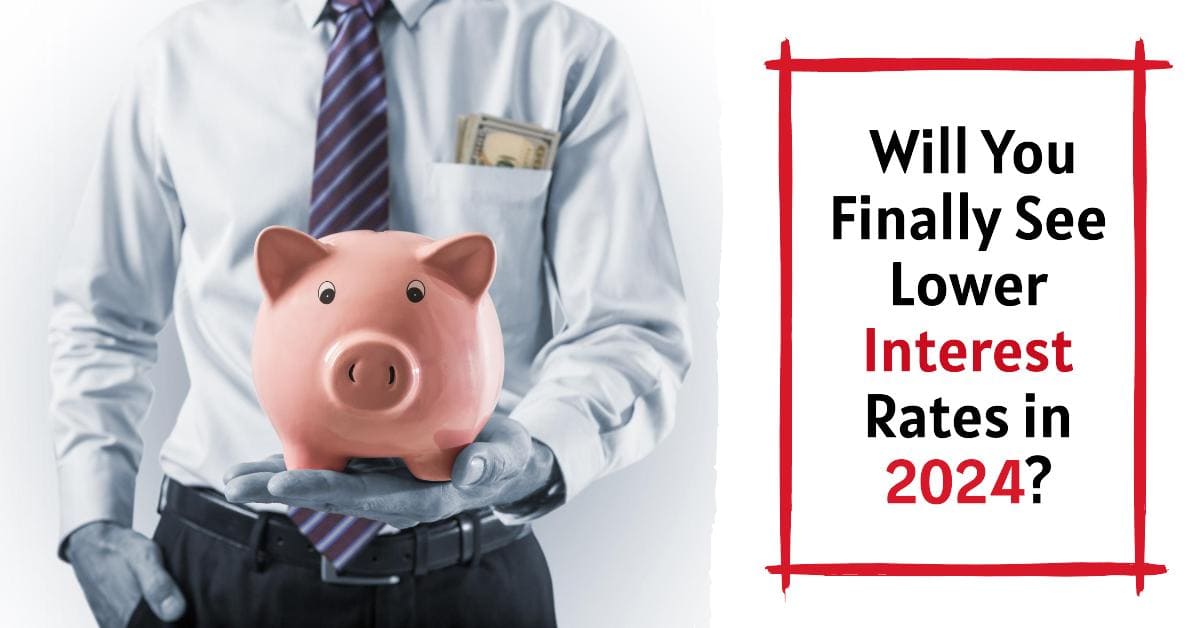If you're thinking about buying a house or refinancing your mortgage, you're probably wondering: are interest rates going to drop anytime soon? Is the Fed cutting rates in 2024? The answer, like many things in the financial world, is a little complicated. Our analysis predicts what's likely for rates. Let's dive into the factors that affect interest rates and what they might mean for you this year.
Will You See Lower Interest Rates in 2024? Buckle Up!
The Fed Calls the Shots
The Federal Reserve, America's central bank, plays a key role in setting interest rates. They do this by adjusting the federal funds rate, which impacts the rates banks charge each other for overnight loans. This, in turn, influences the interest rates that banks offer to consumers like you and me for mortgages, car loans, and other borrowings.
As of May 2024, the Federal Reserve's benchmark federal funds rate has been 5.25% to 5.50% for six consecutive months. The Fed has kept rates high to reduce inflation, but has also indicated that it may cut rates later in 2024 if data warrants it.
Potential homebuyers hoping for a drop in mortgage rates will be watching the Federal Reserve meeting closely on June 11-12th. The Fed hinted at rate cuts in 2024, but high inflation has put those plans on hold. Experts predict the Fed will likely hold rates steady, keeping mortgage rates around their current 7% mark.
The Fed doesn't set mortgage rates, but lenders follow their lead. Mortgage rates are high, averaging over 7% for 30-year fixed loans as of June 4, 2024.
Inflation is the Enemy
As of April 2024, inflation in the United States was at 3.4% for the year. This means that the overall cost of goods and services increased by 3.4% compared to April 2023. This is slightly higher than the long-term average inflation rate of 3.28%.
Inflation is measured by the Consumer Price Index (CPI), which tracks the price changes of a fixed basket of goods and services. The Fed keeps a close eye on inflation, because when it's too high, it can erode the purchasing power of your dollar.
To cool things down, the Fed typically raises interest rates. This makes borrowing more expensive, encouraging people to spend less and save more. Ideally, this slows down the economy and brings inflation back under control.
Investors are currently anticipating one or two 0.25% rate cuts starting in the fall, which is a change from the six to seven cuts that were expected in January. However, some FOMC participants are still concerned about inflation and may be reluctant to cut rates.
Mixed Signals
Earlier this year, the Fed signaled its intention to cut interest rates later in 2024. However, recent economic data has been mixed. While economic growth slowed in the first quarter of 2024, at 1.6%, it was still positive.
This growth was driven by consumer spending and housing investment, but offset by a decrease in business investment. On the other hand, inflation remains stubbornly high at 3.4%.
This mixed bag of data has caused the Fed to put those rate cuts on hold for now. They'll likely wait to see a clearer picture of where the economy is headed before making any moves.
What This Means for You
So, what does this all mean for potential homebuyers and those looking to refinance? Here's the reality:
- Rates might not drop as much as expected. Earlier predictions of significant interest rate cuts in 2024 seem less likely now. The Federal Reserve may only reduce rates by a small margin, if at all. This means that if you're hoping for a dramatic drop in borrowing costs, you might be disappointed.
- Be prepared for some bumps. The economic picture is still unfolding, and unexpected events could push rates in either direction. For instance, a surge in inflation could prompt the Fed to raise rates again to cool things down. Conversely, a sudden economic downturn could lead them to cut rates more aggressively to stimulate borrowing and investment. The key is to stay informed about economic developments and be flexible with your plans.
- Consider the bigger picture. Even if interest rates don't fall as much as some experts initially anticipated, they could still remain historically low. Remember, rates have been at record lows for many years. So, even a small increase might still leave them very attractive in the long run. When making your decision, factor in not just the interest rate but also the overall cost of the house, your long-term financial goals, and your personal housing needs.
Don't Wait for the Perfect Moment
Here's the truth: there's never a perfect time to buy a house. If you've found the right home and can afford the monthly payments, don't let the fear of slightly higher interest rates hold you back. Remember, rates have been historically low for many years, and even a small increase might still leave them very attractive in the long run.
Work with a Pro
A good real estate agent can be your secret weapon in this market. They can help you understand your options, find the right home, and negotiate the best possible deal. They'll also keep you up-to-date on the latest interest rate trends and help you make informed decisions.
The bottom line? Stay informed, be flexible, and don't be afraid to act if you find a good opportunity. With the right guidance and a smart plan, you can achieve your homeownership goals even in this uncertain interest rate environment.
ALSO READ:
Interest Rate Predictions for Next 2 Years: Expert Forecast
Interest Rates Predictions for 5 Years: Where Are Rates Headed?
When is the Next Fed Meeting on Interest Rates in 2024?
Mortgage Rate Predictions for Next 5 Years
Mortgage Rate Predictions for the Next 2 Years
Mortgage Rate Predictions for Next 3 Years: Double Digit Rise



